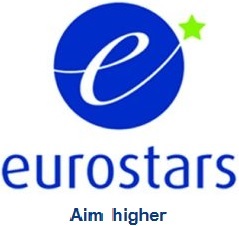 newsitems
newsitems  EUROCORPS Commander +EU JHA Head to EuroFora: Lisbon Treaty's Human Rights +Security/Defence horizon
EUROCORPS Commander +EU JHA Head to EuroFora: Lisbon Treaty's Human Rights +Security/Defence horizon
EUROCORPS Commander +EU JHA Head to EuroFora: Lisbon Treaty's Human Rights +Security/Defence horizon
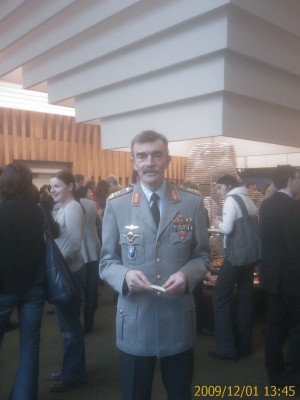
They both stressed in Strasbourg, headquarters of the European Court of Human Rights and of EUROCORPS, that, now, with Lisbon Treaty, new horizons on Human Rights and EU's Security and Defence have become possible and could evolve fast, mainly via the new method of "reinforced cooperations", but effective developments, and their timing, depend on political will....
In addition to EU's new Charter on Fundamental Freedoms, which entered into force today, Lisbon Treaty makes it possible and incites the EU to also become a member of the older and larger panEuropean Convention on Human Rights :
A "useful" move both in order to ensure a "coherence" on EU Citizens' rights' case-law between the EU Court of Justice at Luxembourg and the European Court of Human Rights in Strasbourg, and because "they don't cover exactly the same areas", Brun observed to "EuroFora".
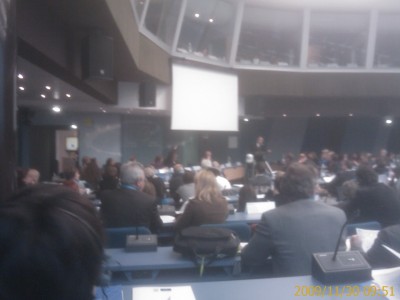
Significantly, he spoke on the sidelines of a joint EU - CoE Conference on Childrens' Rights, fex. vis a vis Adoptions, trafficking, etc, where participants (EU/CoE Officials, politicians, experts, NGOs, journalists, and even individuals whose life had been seriously affected by various related issues) held "hot" discussions highlighting various problems still in need of the right answers, well beyond an International Hague's Treaty and a specific CoE's Convention, which still left several unanswered questions open
For the Legal, technical matters, "we have been prepared since a long time ago, so that we can move quite fast" for EU's accession to the ECHR, the experienced EU's Head of JHA's services told us.
According to CoE's sources, this might, eventually, include, fex. also a guarantee that EU institution's acts would be monitored by a special EuroCourt's Chamber composed by EuroJudges coming only from EU Member States, and not from other, Third Countries, among PanEuropean CoE's 47 Member States.
- "But the ratification process might take longer than scheduled", Brun warned. Eventual delays might come "not so much from EU Member States, since they have all, already accepted Lisbon Treaty which provides for EU's accession to the ECHR, but from others" : The PanEuropean "CoE (under whose auspices works EuroCourt) has 47 Member States, i.e. 20 Countries more than the EU (fex., since the end of the "Cold War" and Germany's and Europe's ReUnification : Russia, Ukraine, and other former "Eastern European" Countries, but also Turkey, etc., since the particular era when the "Cold War" had started in the Past : 1950).
So, "we don't know, in advance, whether there might be any objection or delay from anyone among these 20 more Third Countries, which are now members of the CoE, but not of the EU", he observed.
That's one of the reasons for which "the ratification (of EU's entry into the ECHR, which will open the possibility for EU Citizens to challenge EU Institutions' acts if they affect their Human Rights) might take as long as about 3 or 5 Years more", the EU Top Official carefully estimated.
- "In fact, it all depends on Political factors", Alain Brun concluded, pointing at the incoming EU Commissioner on Justice and Home affairs, Mrs Viviane Reding from Luxembourg, who has been appointed in order to succeed to Jacques Barrot from France in the framework of the New EU Commission from January 2010.
------------------------------------------.
But developments might be faster on another, partly complementary, issue of particular importance to Strasbourg-headquartered European bodies : EU Defence and Security capabilities, mainly with EUROCORPS, the multi-modal and multi-national European Army's "Etat Major" :
- After Strasbourg Treaty entered into force, at the beginning of 2009, ratified by all 5 "Framework Nations" (France, Germany, Belgium, Luxembourg, Spain), to which are added other 5 "Sending" Nations represented by Liaison Officers, while EU Parliament was voting a landmark Resolution calling for the creation of a European Defence and Security policy based on the use of EUROCORPS' tool, it has a Legal frame and Democratic support for further developments of a European Defence, observed his New Chief :
- "What is needed now is that somewhere among the framework nations, emerges a "Driving Force" to boost the European Defence and Security policy", stressed from the outset EUROCORPS' new Commander for 2009-2010, Lieutenant General Hans-Lothar Domroese from Germany, speaking to "EuroFora".
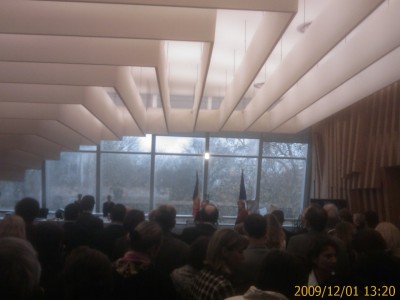
Perhaps significantly of EUROCORPS' Enlargement possibilities, his new Commander took over his duties by succeeding to a Spanish General, just before Spain chairs the EU in the 1st semester of 2010, and was present at a CoE event on the "double Anniversary of Romania's National Day and of EU Lisbon Treaty, on December 1st 2009", as CoE's Deputy Secretary General, Mrs Maud de Boer-Bucquichio observed
Domroese, speaking the day Lisbon Treaty entered into force, akcnowledged that the possibility it provides for "Reinforced Cooperations" speaheaded by initiatives undertaken by some pioneer EU Member States and open to all other willing EU Member Countries is an adequate and efficient tool in that direction.
- "But, in fact, it all depends on Political WIll", EUROCORPS' new Commander warned.
Domroese, who has already served even at Afghanistan for a few months at the beginning of 2009, aqreed however with "EuroFora" that, at least at the start, EU's Defence capabilities' development can become soon Popular among EU Citizens, fex. by protecting EU's external borders, intervening in Peace-keeping operations in preference around Europe's Neighbouring Countries, (fex. in Cyprus, if a Peace deal for its ReUnification is made with a European/International Guarantee), helping to face "Natural Desasters", etc
The new EUROCORPS' Commander, who took over his duties on September 2009 for 2 crucial years, speaking at the CoE to "EuroFora" appeared optimistic but also careful to further enhance both EUROCORPS' capabilities and political support in 2010.
ESDP was the only one among France's 2008 EU Presidency's priorities who did not had enough time to be fulfilled then, particularly after it had to struggle (successfully) both against the unforeseen Global Economic Crisis and to stop an unprecedented Russia - Georgia War.
Significantly, EU Parliament has recently decided to create, for the 1st time, a specific "Security and Defence Committee", which had been initially entrusted to the experienced German f. MEP Carl Von Wogau, from nearby Fribourg, (the "father" of EU's Monetary Union among MEPs, since he had worked for 10 Years as former President of EU Parliament's Economic Committee for the creation of EuroZone, before starting to help build EU's Defence). After June 2009 EU Elections, EU Parliament elected as new President of its Security and Defence Committee the mainstream new MEP Arnould Danjean, from the Governing French Party UMP, a specialist of ESDP and GeoPolitical issues with personal experience even on the spot (Balkans, etc), who is well known among French President Nicolas Sarkozy's close councilors, as well informed sources from the Presidential Elysee palace said to "EuroFora".
Main Menu
Home Press Deontology/Ethics 2009 Innovation Year EU endorses EuroFora's idea Multi-Lingual FORUM Subscribers/Donors FAQs Advanced search EuroFora supports Seabird newsitems In Brief European Headquarters' MAPs CoE Journalists Protection PlatformBRIEF NEWS
- 00:00 - 02.06.2021
- 00:00 - 18.10.2020
- 00:00 - 19.06.2020
- 00:00 - 18.05.2020
- 00:00 - 20.04.2020
- 00:00 - 02.02.2020
- 00:00 - 09.12.2019
- 00:00 - 27.11.2019
- 00:00 - 16.11.2019
Popular
- Yes, we could have prevented Ferguson riots says World Democracy Forum's Young American NGO to ERFRA
- Spanish People Elect CenterRIGHT Majority with 1st Party and Total of 178 MPs (6 More than the Left)
- Pflimlin's vision
- The European Athletic "Dream Team", after Barcelona 2010 Sport Championship Results
- Source Conseil d'Europe à ERFRA: Debatre Liberté d'Opposants à Loi livrant Mariage+Enfants à Homos ?
- Head of BioEthics InterGroup, MEP Peter Liese : "Embryonic stem cell research reaching its END" !?
- Spain: Jailed Turkish Terror suspect with Explosive,Drones,Chechen accomplices stirs Merah+ Burgas ?
- UN Head Ban Ki Moon at CoE World Democracy Forum : - "Listen to the People !"
Latest News
- Test Photos (f.ex.+ Invit to EU + Korea Peace meeting)
- EUOmbudsmen Conference 2022: Digital Gaps affect People's Trust threaten EF Project on EU Future ?
- French Election : Black Out on Virus, but Obligation for Fake 'Vaccines" Challenged
- Both French Presidential Candidates point at "Humanism" in crucial times...
- France : Zemmour = Outsider may become Game Changer in Presidential + Parliamentary Elections 2022
Statistics
Посетителей: 62157799Archive
Login Form
Other Menu
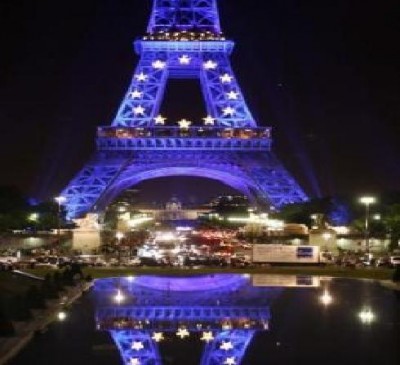
- "Europe must be liberated from this undermining "wooden talk" of a "unique thought" which hampers democratic debates", stressed incoming EU Chairman, French President Nicolas Sarkozy, speaking to Journalists after his official meeting with EU Commission's President, Jose Barroso, at Elysee Palace in Paris
- "It's precisely because there are not enough Debates, that EU hasn't managed yet to make it clear to European citizens what is really at stake", he added, in an obvious reference to the latest Irish "No" in 2008, after a long series of similar, unprecedented events, from the 1st Majority Abstention to EU Parliament's Elections in 1999, repeated in 2004, to the Dutch and French "No" in 2005, etc.
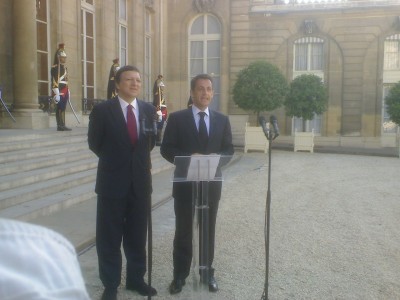
- "This is not an easy period, but we shall act with determination, while also listening to Citizens' views", he promised.
Sarkozy's move came shortly before his opening Speech, next week in EU Parliament in Strasbourg, for the first Public Debate on the Priorities of the French EU Presidency (July - December 2008), and that's one of the reasons for which he significantly opened his EU Council's Chairmanship by welcoming at Elysee palace EU Parliament's President, German MEP Hans Gert Poettering at first..
The incoming EU Chairman was replying to Press Questions about rumours that controversial British EU Commissioner on Trade, Mandelson, was alone to drop an invitation to have a working Diner at Elysee palace, together with all other EU Commissioners and the French Government, only because he would have been upset for some critical points made earlier by President Sarkozy in defense of European Agriculture vis-a-vis its Foreign competitors.
But, as smiling Sarkozy played down Mandelson's reported refusal to debate, saying that he had to visit Marseille for a Ministerial meeting on Trade the next morning, and that "all our British friends are always welcome to taste a nice diner" in France, perhaps at another occasion..
- "It's urgent to win anew the trust of the People" : Lately, "the European ideal lost its momentum. Since several years, whenever Citizens are questioned on Europe, they react with reserves : They even have .. a tendency to reply "NO".. After this 3rd "No" of a People in some years, there is an Urgency to convince", added French Prime Minister Francois Fillon, after a meeting earlier the same day of all Ministers with EU Commissioners, followed by an interview with Barroso
"According to recent Polls, only 30% of French people believe that the European construction is a source of hope. It's only a poll, but we all now quite well, that, since 2005, it's dangerous to neglect these alarming signals, as it would be dangerous to treat with contempt the Irish "No", Fillon warned.
"We all have a common duty to prove to the European Citizens who have doubts, that EU is more useful, more necessary, than ever" : And "that EU can take decisions needed in order to respond to European or Global challenges", the Prime Minister concluded.
- "We believe, together with President Sarkozy, that EU should open debates on all issues of direct, concrete interest to Citizens", confirmed later to EuroFora the Head of France's governing party (UMP), Patrick Devedjan, after his speech to the European People's party (EPP) Study Days in Paris (2 - 4 July 2008).
He didn't deny that one of them is Turkey : - "Public Opinion in France is very much unfavorable to Turkey's EU bid, and President Sarkozy has said that several times", he told EuroFora.
From European Central Bank's controversial policies on Euro's value, to EU Enlargement Strategy, etc., issues of obvious importance to EU Citizens will be plenty, next week in EU Parliament in Strasbourg, before President Sarkozy launches the debates on EU 2008 French chairmanship's priorities on Thursday.













